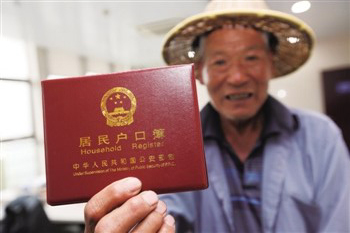Balancing development amid deeper reforms

A former peasant holds his household register that confirms his new status as an urban resident. Reforms to the hukou system aim to allow existing migrant workers to fully participate in the economy and narrow the welfare gap between rural and urban residents.
The year 2014 is of significance in the process of China’s reform. It is generally viewed as the first year of comprehensively deepening reform. All reform measures determined at the Third Plenary Session of the 18th Communist Party of China (CPC) Central Committee were launched last year, among which the two-child policy has attracted wide attention. The policy will play a positive role in promoting the long-term balanced development of China’s population.
Scholars have discussed the impact of the new family planning policy. Meanwhile, further reform of the hukou (household registration) system has accelerated the process of urbanization. Problems in the process, such as the floating population and their social insurance, have also drawn attention from academics.
Discussion on ‘two-child’ policy
The Decision of the Central Committee of the Communist Party of China (CCCPC) on Major Issues Concerning Comprehensively Deepening the Reform passed at the Third Plenary Session of the 18th CPC Central Committee explicitly stated that “while persisting in the basic national policy of family planning, we will initiate a policy that allows married couples to have two children if one of the parents is a single child, and gradually adjust and improve the birth policy to promote balanced population growth in the long run.”
The two-child policy aroused extensive discussion in academia as soon as it was put forward. Scholars asserted that objective judgment on negative impact of the new policy is needed, while positively evaluating its beneficial effects. They also analyzed concrete problems concerning the implementation of the two-child policy, such as positioning of target groups and calculating measures for newborns.
In addition, they stressed significance and urgency of adjusting the birth policy, and shared experience and lessons from foreign countries in implementing adjustments to population policy.
Analysis of aging population
Population aging is still what academia paid more attention to in 2014. The adjustment to the birth policy is to some extent a positive response to the increasingly prominent problem of aging. Population aging has an all-round impact on society. Scholars focus most on the following realms.
Firstly, they analyzed the tendency of China’s population aging and differences in geographical distribution.
Secondly, they discussed the aging problem including the supporting model, caring costs and health condition of the aged. Additionally, they paid attention to vulnerable aging groups, such as the “empty-nest elderly” in rural areas who live apart from their adult children and aged parents who have lost their only child.
Thirdly, scholars studied effects and problems of China’s endowment insurance as well as its prospects.
Fourthly, they discussed the impact of the aging population on economic development.
Fifthly, they further stressed the significance of adjusting the industrial structure in the context of the aging population. On one hand, the industrial structure and labor quality should be promoted to confront challenges of the declining labor force. On the other hand, service industry may be vigorously developed to encounter possible opportunities resulting from the aging society.
Hukou reform and urbanization
In 2014, the Politburo of the CPC Central Committee examined and approved Opinions of the State Council on Further Promoting the Reform of the Household Registration System, which include promoting the coverage of urban basic public services for permanent residents. Scholars deeply examined the document and discussed reform of the hukou system from the following perspectives.
Firstly, they positively evaluated the beneficial effect hukou reform will have on urbanization. Meanwhile, they analyzed possible problems in implementing the policy and reflected on population management approaches during the transitional period of hukou reform.
Secondly, they studied the tendency of China’s urbanization development and urban cluster effect as well as migration patterns of laboring population.
Thirdly, they discussed social inclusion of rural migrant workers and social security of “left-behind children,” or children living apart from their migrant-worker parents, and elderly people in rural areas.
It can be seen from the above research that reflections of academia on the new reform policy is conducive to further perfecting the measures of the new type of urbanization reform, and will also play a positive role in implementing the policy.
Apart from the aforementioned studies, 2014 demography also focused on population health. Studies were also carried out into main factors affecting residents’ health, analysis on self-care ability of the elderly and their demands for long-term care, and the health of “left-behind children.”
With China’s sex ratio at birth rising, academia has also attached great importance to studies of gender equality, which mainly concentrates on females’ employment level and stability as well as the gender difference in economic income.
Successful models in social security and aged care from overseas have provided reference for implementation and perfection of China’s relevant policies.
Demography aims to provide effective facts for formulation and adjustment of policies. Demography studies in 2014 responded to hotspots of relevant policy and reform, centered on the two-child policy, population aging and hukou system reform.
Implementation of the two-child policy can play a practical role in easing China’s aging population pressure and achieving sustainable population development. Reform of the hukou system will push forward new-type urbanization, reflecting the human-centered strategic concept in the process of new-type urbanization.
In general, 2014 studies of demography presented multiple research perspectives and also highlighted main problems of population and society.
The authors are both from the Department of Sociology at Peking University.
